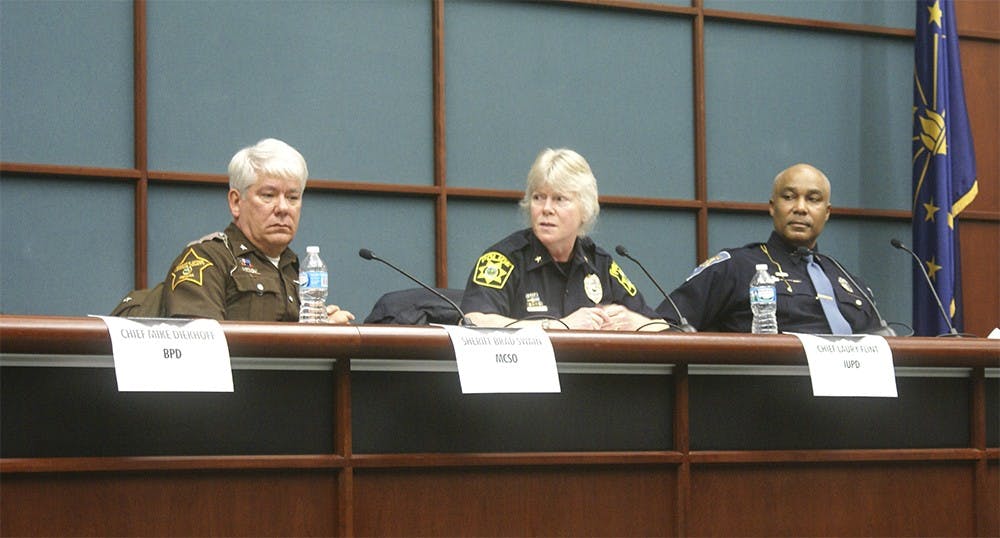In January, the Safe and Civil City Program initiated a forum that would encourage trust between police officers and civilians. During that meeting, questions were often heated and the audience seemed generally skeptical. Thursday’s audience appeared more at ease and asked questions that were general in nature.
Bloomington Police Department Chief of Police Mike Diekhoff, Monroe County Sheriff Brad Swain, IU Police Department Chief of Police Laury Flint and Captain Ruben Martè from the Indiana State Police made up the panel.
Assistant professor of criminal justice Akwasi Owusu-Bempah moderated the discussion.
“Since you were last here on January 22, have you made any changes in your departments?” Owusu-Bemapah said.
Martè and Flint said they had changed and implemented new diversity training within their police academies. Swain said the Monroe County Jail was working on a mental health unit.
“We’re trying to change the perception of police with younger people,” Diekhoff said. “We held a week-long academy to introduce kids into police. We had about 45 kids in that program.”
The changes in police training weren’t just necessary because law enforcement officers are under scrutiny but because the number of people looking to pursue careers in law enforcement is dropping, the officers said.
“Law enforcement is under the microscope,” Diekhoff said. “When you’re looking to hire people, they’re not interested in facing that kind of criticism.”
Martè said the state police were dealing with a lack of applicants as well.
“The numbers are just not what they were,” Martè said. “What’s the solution? We just don’t know.”
Maqubè Reese, an academic advisor from IU, told the officers that students frequently asked her if she knew how they should respond if there was a gunman on campus.
“Would we be prepared for something like that? Would we be ready?” Resse said. “I don’t want to tell them, ‘look for an alert.’”
“There was actually a discussion about doing drills in classrooms so they would know what to do were that to happen,” Diekhoff said. “But I don’t work with IU, so I can’t tell you exactly what they would do.”
Flint declined to explain further but said there were emergency plans in place.
“Definitely we will take care of an active shooter on campus,” Flint said.
One audience member asked the officers if they believed IU students were treated differently from homeless people who committed similar offenses.
Diekhoff and Laruy said they disagreed.
“We probably arrest more IU students than homeless people,” Diekhoff said.
Cornelius Wright, chair of the Commission of the Status of Black Males, said he believed some of the public’s frustration with law enforcement was a byproduct of police officers’ not being held accountable for their actions.
Martè agreed but said the Indiana State Police Department had a formal “peer-to-peer” system where officers could quietly report misconduct they observed.
“We have officers in jail for doing things they shouldn’t have done,” Martè said.
Diekhoff said while BPD has no formal system, he too had officers fired for misconduct reported by other officers.
The law enforcement officials said they recognized the need for accountability and a change in tactics but also were frustrated with the negative attention.
“When our officers do a good job, no one hears about it,” Martè said.






